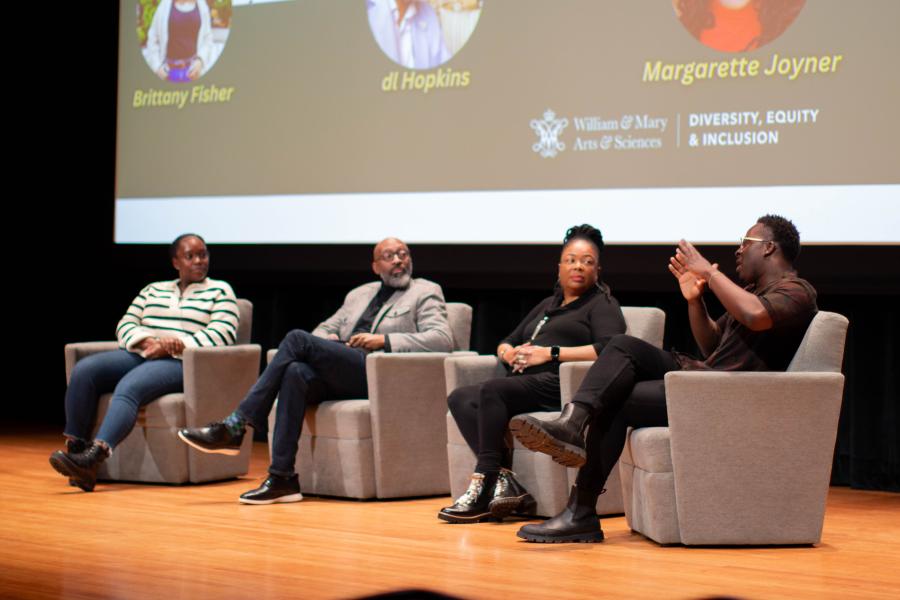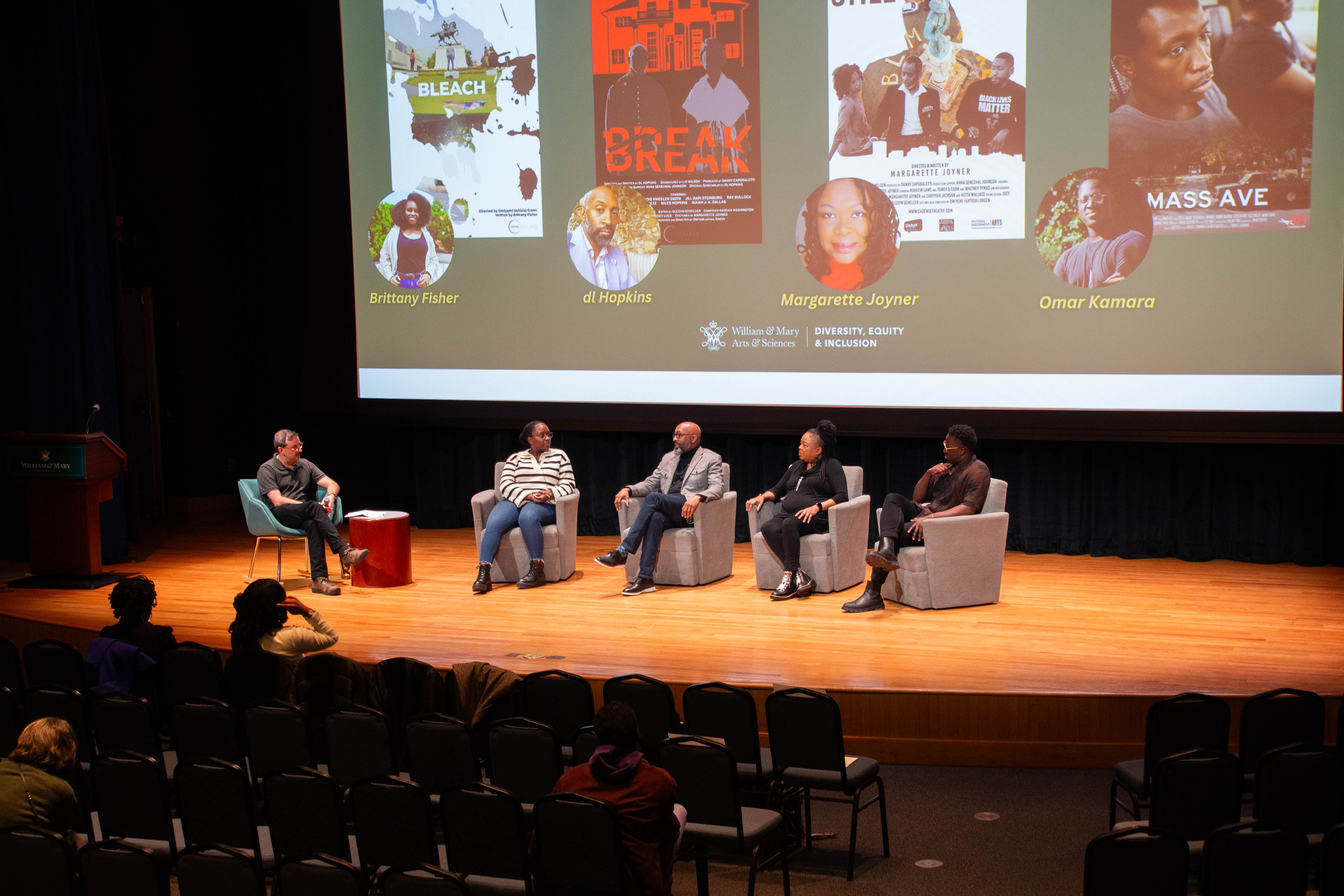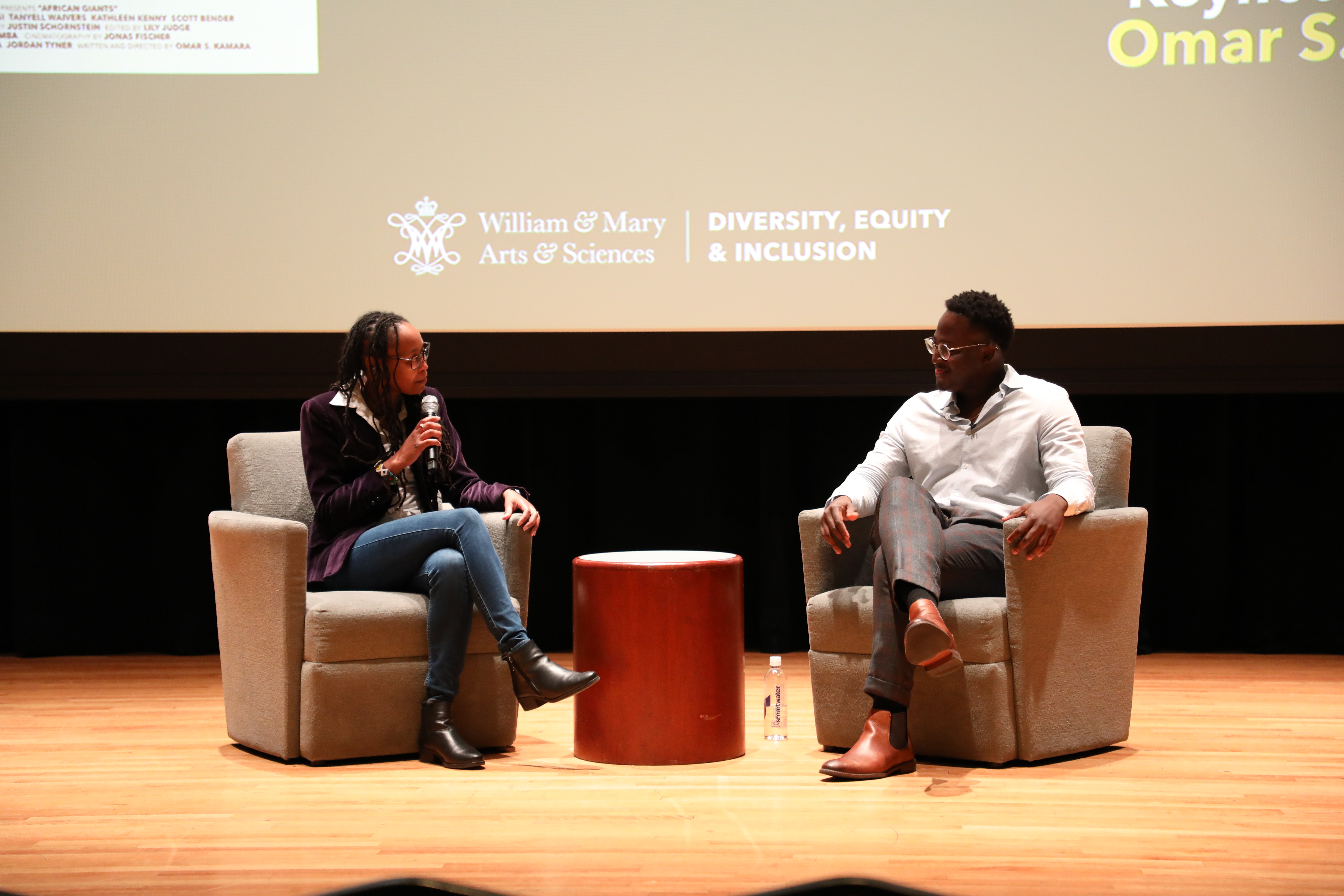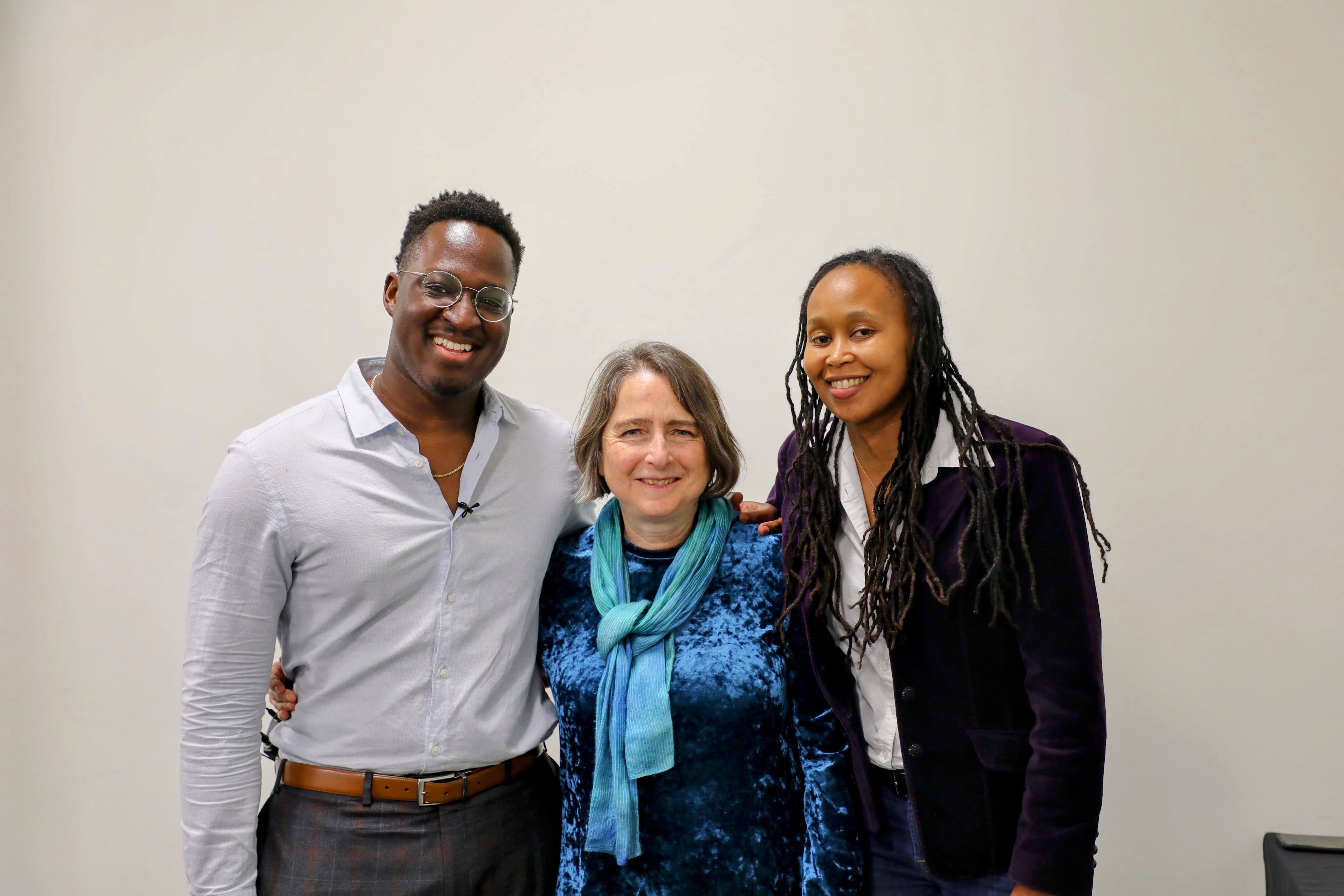Film and Blackness: Filmmakers Explore Race at William & Mary’s Second Annual Inclusive Inquiry Speaker Series
 William & Mary’s second annual Inclusive Inquiry Speaker Series turned to motion pictures to rebuild forms of connection. The speaker series, led by Arts & Sciences Associate Dean for Diversity, Equity, & Inclusion, Wanjirũ Mbure, hosted four filmmakers and screened their films to spark conversations on intersections of Black and African American experiences.
William & Mary’s second annual Inclusive Inquiry Speaker Series turned to motion pictures to rebuild forms of connection. The speaker series, led by Arts & Sciences Associate Dean for Diversity, Equity, & Inclusion, Wanjirũ Mbure, hosted four filmmakers and screened their films to spark conversations on intersections of Black and African American experiences.
The 2024 Speaker Series partnered with filmmaker, American Film Institute graduate, and W&M alumnus Omar S. Kamara (2015) and Sitelines BLM ACTION!, a project of Richmond-based theater company, Cadence. Sitelines is led by W&M Professor of Theatre and Africana Studies Omiyẹmi (Artisia) Green. She describes the goal of Sitelines as “to tell stories about local Virginia history in new ‘seeing places’ beyond the theatre, which at the time of the program’s inception were not available for use due to COVID-19, and to use the films as educational tools for bringing disparate voices together with support for a robust and difficult community discussion about race and racism.”
Over the two-day event from February 22-23, the series screened two films by Kamara, a short film and a feature-length film, and four short films by Sitelines screenwriters dl Hopkins, Margarette Joyner, and Brittany Fisher. The films articulated the Black experience in America by exploring place, history, family, and the challenges of change. For Mbure, the films “spoke powerfully about difference – across experiences, generations, identities – as well as the everyday practices that foster the building blocks of inclusion work: discovery of common ground, shared understanding, and purposeful actions.”
Suzanne Raitt, Dean of the Faculty of Arts & Sciences, attended the event and introduced Kamara as the keynote speaker. Raitt reiterated the importance of the Inclusive Inquiry Speaker Series to facilitate important insights and conversations. “I’m proud to support this series and the rich conversations, learning and discovery facilitates,” she said. “Our guest filmmakers were incredibly generous sharing their art and creativity with us during this event. I am so grateful we could bring this opportunity to campus.”
 Hopkins’s Break contrasts the history of Black subjugation against personal White arrogance. The Black protagonist, Jackson Ward, opens the film by recalling to his coworkers the experience of being invited to attend a dinner party located on the site of a former plantation. The film then alternates between Jackson explaining the situation to his amused coworkers and the surrealist journey of Jackson and his wife driving to the dinner and realizing that the venue is a historical site of Black enslavement. Joyner’s Still Fighting crosses generational lines to connect contemporary Black activism to the Civil Rights Movement and Vietnam War. A conversation between a Black Vietnam War veteran and younger Black activist at the Virginia War Memorial explores difficult questions on fighting for social progress amid persistent violence towards Black Americans. Fisher’s Bleach follows Break and Still Fighting by confronting the pretense of personal white allyship toward the Black Lives Matter movement. Against the backdrop of Kehinde Wiley’s Rumors of War statue at the Virginia Museum of Fine Arts, three young poets converse and lyricize about everyday practices of resisting the erasure of Black experiences. W&M student Jarius Alexander highlighted Break as a resonant film – “Break stood out for me as it touched on microaggressions and white ignorance in spaces that are trying to be more accepting.”
Hopkins’s Break contrasts the history of Black subjugation against personal White arrogance. The Black protagonist, Jackson Ward, opens the film by recalling to his coworkers the experience of being invited to attend a dinner party located on the site of a former plantation. The film then alternates between Jackson explaining the situation to his amused coworkers and the surrealist journey of Jackson and his wife driving to the dinner and realizing that the venue is a historical site of Black enslavement. Joyner’s Still Fighting crosses generational lines to connect contemporary Black activism to the Civil Rights Movement and Vietnam War. A conversation between a Black Vietnam War veteran and younger Black activist at the Virginia War Memorial explores difficult questions on fighting for social progress amid persistent violence towards Black Americans. Fisher’s Bleach follows Break and Still Fighting by confronting the pretense of personal white allyship toward the Black Lives Matter movement. Against the backdrop of Kehinde Wiley’s Rumors of War statue at the Virginia Museum of Fine Arts, three young poets converse and lyricize about everyday practices of resisting the erasure of Black experiences. W&M student Jarius Alexander highlighted Break as a resonant film – “Break stood out for me as it touched on microaggressions and white ignorance in spaces that are trying to be more accepting.”
Kamara’s Mass Ave looks at the Black experience from the perspective of a tense father-son relationship. The father, a Sierra Leonean immigrant, and son, Macca, navigate uncomfortable conversations and diverging opinions on being black in America over a day of landscape work in an affluent Washington D.C. suburb. Their contrasting perspectives collide when they are racially profiled by police. Kamara’s feature-length film African Giants carries Mass Ave’s familial themes to the relationship between first-generation Sierra Leonean American brothers, Alhaji and Sheku. Giants follows Alhaji and Sheku bonding over career struggles, African identity, and changing familial relationships over a weekend in Los Angeles, California.
Community attendee and W&M alumnus Casey Lenhart spoke to the thematic connections that united the films while also highlighting Omar’s filmmaking style – “I really loved the speaker series. I thought the films complemented each other on their central themes. Obviously, each one was based on an experience personal to them. But I think you could find crossovers between each film. Whether that be generational trauma, police harassment, activism fatigue, and societal expectations. I would say my favorite of the shorts was Mass Ave. That short made me feel the most immersed in Omar’s perspective. His filmmaking style and storytelling is so unique to him. Watching Mass Ave and African Giants together revealed how Omar is able to tell a story about his father through different paths. I think that alone shows how creative he is as a filmmaker.”
 Teaching Professor of Africana Studies and Linguistics, Iyabo Osiapem, who attended the sessions, spoke about the emotional impact. “The selection of films that were shown illustrated the diverse experience of Black people during our 2020 summer awakening. Professor Green’s three short films expressed some of the anxiety and fear that I felt that summer. Plus, I was thrilled to know that Omar Kamara, a former student, directed such a fantastic depiction of a complicated father/son relationship in the short film. That film really grabbed my heart, which was in my chest ready to explode during the last moments of that film.”
Teaching Professor of Africana Studies and Linguistics, Iyabo Osiapem, who attended the sessions, spoke about the emotional impact. “The selection of films that were shown illustrated the diverse experience of Black people during our 2020 summer awakening. Professor Green’s three short films expressed some of the anxiety and fear that I felt that summer. Plus, I was thrilled to know that Omar Kamara, a former student, directed such a fantastic depiction of a complicated father/son relationship in the short film. That film really grabbed my heart, which was in my chest ready to explode during the last moments of that film.”
A Q&A session with the filmmakers and a keynote speech by Kamara, followed the screenings. These conversations allowed the filmmakers to connect their life experiences to the films and accentuate the need for dialogue about race, difference, and change. Hopkins discussed how his own experience of attending an event at a former plantation shaped the surrealist elements of Break. Joyner explained her choice of creating a quiet film to challenge stereotypes of Black women. Fisher drew on the pandemic to describe her inspiration for using bleach as a metaphor for erasing Black experiences. Kamara discussed how his relationship with his father, an African immigrant, has shaped his art and identity. The first day of the series ended a central element of the Sitelines project – a Welcome Table conversation. In this space, attendees gathered in small groups to discuss their perceptions of the film with the support of a facilitator.
The series resonated with W&M student Jarel White’s filmmaking ambitions – “I had the pleasure of volunteering at the Inclusive Inquiry Series, where I got to meet various film talent, including William & Mary's own Omar Kamara. To see someone who graduated from the same college as you, who's also a child of immigrants, and, most importantly, also a black-American filmmaker making extremely personal films on his own terms, was inspiring to say the least. Through this series and having the opportunity to talk with Omar after the screening of his new movie African Giants (mostly about our shared love for Barry Jenkins), I came away feeling that my filmmaking dreams were possible.”
 Thomas K. Ruppert, Assistant Provost for Coastal Resilience and Director of the Virginia Coastal Resilience Collaborative at W&M, attended the event and praised the series for boldly addressing US race relations at a needed time – “The Arts & Sciences Inclusive Inquiry Speaker Series provides yet another demonstration by W&M that W&M is the right place to be. The series of short films shown on Feb. 22 as part of the series demonstrated those living with the current challenges emanating from our country’s racial history play a central role in furthering the difficult conversations we need to have for true change and healing. Listening to W&M alum Omar Kamara discussing his journey into filmmaking really made the evening special and makes one proud to be part of the tradition of W&M as well as creating what will be the traditions of the future.”
Thomas K. Ruppert, Assistant Provost for Coastal Resilience and Director of the Virginia Coastal Resilience Collaborative at W&M, attended the event and praised the series for boldly addressing US race relations at a needed time – “The Arts & Sciences Inclusive Inquiry Speaker Series provides yet another demonstration by W&M that W&M is the right place to be. The series of short films shown on Feb. 22 as part of the series demonstrated those living with the current challenges emanating from our country’s racial history play a central role in furthering the difficult conversations we need to have for true change and healing. Listening to W&M alum Omar Kamara discussing his journey into filmmaking really made the evening special and makes one proud to be part of the tradition of W&M as well as creating what will be the traditions of the future.”














